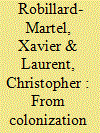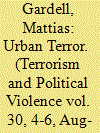|
|
|
Sort Order |
|
|
|
Items / Page
|
|
|
|
|
|
|
| Srl | Item |
| 1 |
ID:
171636


|
|
|
|
|
| Summary/Abstract |
Some scholars have argued that anti-Korean oppression is disappearing from Japanese society, and that race is irrelevant to the current condition of Zainichi Koreans, Japan’s disenfranchised postcolonial minority. In contrast to these views, this article builds on racial formation theory to retrace the historical development of racism in Japan, and to reveal its continuing impact on the lives of Zainichi Koreans. It remarks that Zainichi Koreans have reacted to oppression in various ways, forging new identities and resisting using the means available to them. But it also contends that the persistence of discriminations and inequalities, as well as the recent rise of ultranationalist groups like Zaitokukai, are proofs of the ongoing marginalization and persecution of Koreans in Japan.
|
|
|
|
|
|
|
|
|
|
|
|
|
|
|
|
| 2 |
ID:
163201


|
|
|
|
|
| Summary/Abstract |
White racist serial killer Peter Mangs is the most politically conscious lone wolf terrorist Sweden has seen thus far. Adopting the tactics of Joseph Paul Franklin to the city of Malmö, Mangs committed at least three murders and twelve murder attempts between 2003 and 2010. Well-versed in white power literature and leaderless resistance tactics, Mangs aimed at “igniting a race war” by shooting Black, Muslim, and Roma citizens to amplify racialized tensions, grievances, and anxieties in the increasingly segregated city. Yet, Mangs is not included in any database of single-actor terrorism, as these depend on how a perpetrator or incident is defined by the police, the courts, and the media. In this case, Mangs’ political motives were ignored by everyone, except by people in the targeted communities and the white racist milieu. This fact highlights the importance of ethnographic methods to terrorism studies. Based on ten three-hour interviews with Mangs, an analysis of his own political writings, previously not known to the public, interviews with Mangs’ victims, their friends and relatives, and extensive fieldwork in Malmö among activists across the political spectrum, including people who hailed Mangs’ deeds as heroic, this essay explores the impact of urban lone wolf terrorism.
|
|
|
|
|
|
|
|
|
|
|
|
|
|
|
|
|
|
|
|
|